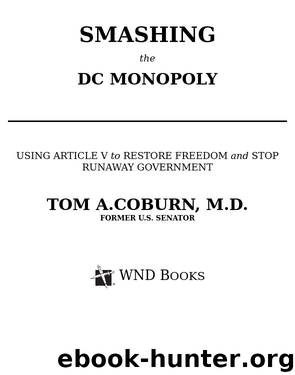Smashing the DC Monopoly by Tom Coburn

Author:Tom Coburn
Language: eng
Format: epub
Publisher: WND Books
A CENTURY OF CONVENTIONS BEFORE 1787
Well before the Federal Convention of 1787, generations of Americans had participated in conventions and grown accustomed to this mode of self-government outside regular colonial and state legislatures. Sometimes elected and sometimes appointed, these ad hoc representative assemblies generally addressed a specific, pressing issue that the regular legislative bodies were either ill suited or unwilling to undertake. Typical of this method of self-governance, the Federal Convention of 1787 (later known as the Constitutional Convention) was called by the states – not by the Articles Congress – to address the dysfunctional government under the Articles of Confederation. The requirement of unanimous approval by the states under the Articles greatly impeded salutary amendments.
The history of self-government by the English-speaking peoples through a legal tradition of conventions is well documented in Russell Caplan’s scholarly narrative, Constitutional Brinksmanship. Prompted by interest after thirty-two states applied to Congress for an amendments convention in the early 1980s, this much-needed work filled a void with its publication in 1988. Caplan’s book was the first systematic study of the convention clause in Article V of the Constitution. His careful research and objective presentation stands in contrast to convention alarmists whose bias shows in their poorly informed opinions. Much of the author’s research is combined in this chapter with more recent scholarship by legal historian Robert Natelson.5 Natelson has done much since 2010 to synthesize legal insight with Caplan’s work and other research from founding-era documents.
The concept of conventions for self-governance has deep roots in British-American history. Following the end of the English Interregnum under Oliver Cromwell, a “convention Parliament” recalled the royal Stuart line to rule England in 1660. This assembly was followed by another convention Parliament in 1689. This conclave adopted the English Bill of Rights and put William and Mary on the throne in the bloodless Glorious Revolution.6
This mode of self-rule was certainly not lost on the English colonies of North America. In 1689, at least four intra-colony conventions were called to replace unpopular governments. In the century before the drafting of Article V at the Federal Convention of 1787, at least twenty-one multi-colony conventions were called. During and after the American Revolution, another eleven multi-state conventions met between 1776 and 1786. These numerous conventions set a clear precedent for the amendment-convention provision in Article V. Thus, the customs and procedures for these kinds of gatherings were well established by 1787.7
Historians have studied four of these conventions extensively, and records show a remarkable consistency in protocol and terminology. The convention “call” was the request, usually by single or multiple colonies or states, inviting some or all of the affiliated governments to an ad hoc assembly. This call was accompanied by the topic or topics for the proposed convention, whose body of members would act as a problem-solving task force.8
A “general convention” drew its name from the broad call for all the colonies or states to meet. The “general” qualifier had no reference to the subject matter of the assembly. A “partial convention” restricted the call to a region of the colonies or the new country.
Download
This site does not store any files on its server. We only index and link to content provided by other sites. Please contact the content providers to delete copyright contents if any and email us, we'll remove relevant links or contents immediately.
| Anthropology | Archaeology |
| Philosophy | Politics & Government |
| Social Sciences | Sociology |
| Women's Studies |
The Secret History by Donna Tartt(19097)
The Social Justice Warrior Handbook by Lisa De Pasquale(12193)
Thirteen Reasons Why by Jay Asher(8915)
This Is How You Lose Her by Junot Diaz(6891)
Weapons of Math Destruction by Cathy O'Neil(6283)
Zero to One by Peter Thiel(5805)
Beartown by Fredrik Backman(5763)
The Myth of the Strong Leader by Archie Brown(5511)
The Fire Next Time by James Baldwin(5452)
How Democracies Die by Steven Levitsky & Daniel Ziblatt(5221)
Promise Me, Dad by Joe Biden(5155)
Stone's Rules by Roger Stone(5089)
A Higher Loyalty: Truth, Lies, and Leadership by James Comey(4965)
100 Deadly Skills by Clint Emerson(4929)
Rise and Kill First by Ronen Bergman(4792)
Secrecy World by Jake Bernstein(4755)
The David Icke Guide to the Global Conspiracy (and how to end it) by David Icke(4721)
The Farm by Tom Rob Smith(4516)
The Doomsday Machine by Daniel Ellsberg(4492)
